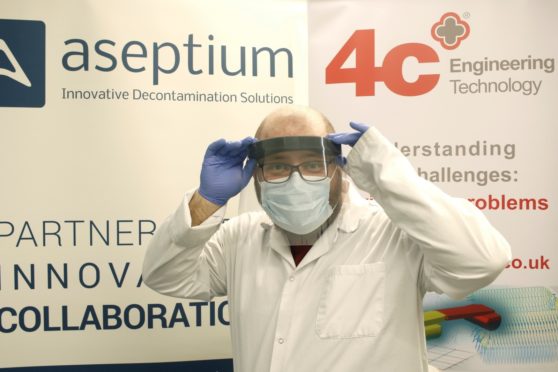Two Inverness companies have joined forces to produce face shields to help protect frontline NHS staff during the pandemic.
Workers at 4c Engineering and Aseptium, who are neighbours at Inverness Campus, contacted Raigmore Hospital to ask how they could use their expertise in technology, rapid manufacturing and decontamination of surgical instruments to help NHS staff.
They have now produced 800 shields and aim to give 1,000 to health workers there.
The design is being made freely available online with full manufacture guidance, on the condition design credit is given and that manufacture is non-profit.
Wider adoption is already under way with Lochgilphead-based Midton Engineering manufacturing the kit for hospitals in Oban and Mid-Argyll.
The scheme got off to a rocky start due to the national lockdown – which severely curtailed the availability of material.
But, with the help of Inverness Chamber of Commerce, the business community rallied round.
The first prototype was presented last week to infection control and intensive care staff.
Pawel de Sternberg Stojalowski, of Aseptium, added: “This project is a testimony to what a collective of engineers can achieve when they face a challenge together. It’s all about community and collaboration.”
Stewart Nicol, chief executive of Inverness Chamber of Commerce, congratulated the workers on an “outstanding and remarkable achievement”.
He added: “The delivery of a substantial quantity of this vital equipment to help NHS Highland deal with the challenge of Covid-19 in such a short timescale is outstanding.
“To make their design ‘open source’ is a credit to everyone at 4c Engineering and it is fantastic to see innovative Highland businesses leading the way.”
Dr Jonathan Whiteside, clinical lead, department of critical care at Raigmore Hospital, said: “Whilst we are generally happy with the NHS supply chain, at times of great demand, such as we are seeing with the Covid-19 pandemic, there can be interruptions or shortages.
“We were delighted to be approached by 4c Engineering, who were able to source materials locally, and produce much-needed protective visors.
“These have been put to immediate clinical use in our Intensive Care Unit, providing staff with the necessary protection and allowing them to continue to provide high quality care, during these difficult times.”
